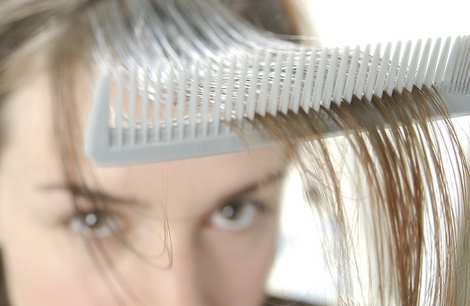Drugs, Stress, and Other Common Hair Loss Triggers

The normal hair growth cycle includes several stages: a period of rapid and stable growth lasting up to six years; a three month “resting” period, when the hair stops its growth; and a period when the hair falls out. In the end of the entire cycle, a new hair replaces the old one and the cycle begin again. During the rapid growth phase, the hair grows about one inch longer every two months. However, this healthy life of the hair can often be disrupted due to a number of causes, the most common of which are inadequate nutrition, medications, high levels of stress, hormonal disruptions, and certain diseases.
When the normal hair growth cycle is disrupted, people experience various degrees of hair loss. A few months after a severe illness, surgery, or an overly emotional and stressful situation, such as divorce, large amounts of hair may suddenly fall out, putting the person even in a bigger distress. Negative emotions, anxiety, or depression usually triggers the elevated production of “stress hormones”, such as adrenalin and cortisol. These powerful chemicals can work to reduce the blood flow that nourishes hair follicles. Prolonged periods of stress and tension deprive scalp hair from receiving adequate nutrients and oxygen, which can provoke massive and seemingly “unexplained” hair loss. Managing stress, curing health problems, or giving the body sufficient rest after a surgery, disease, or anxiety-provoking situations usually resolves hair loss within several months.
Genetic predisposition to baldness or hormonal problems, such as menopausal changes, can trigger sudden or gradual hair loss, as well. In addition, some drugs can directly affect healthy hair growth. Cancer medications used in chemotherapy, radiation, antidepressants, drugs that treat gout and other forms of arthritis, antibiotics, birth control pills, cholesterol-lowering medications, and anticoagulants are proven to induce hair loss in a substantial percentage of users. Many people do not know that general anaesthesia can sometimes trigger bulky, yet temporary hair shedding, too.
Permanent hair loss can be caused by mechanical damage, often due to tight hairstyles that irreversibly damage hair follicles. Mechanically-induced traction alopecia can follow months of styling your hair in braids, cornrows, or tight ponytails. The same degree of hair damage can be induced by a habitual application of harsh chemicals contained in many hair dyes and even “hair care” products that, ironically, are advertised as hair remedies. It would be wise to always check the list of ingredients before purchasing a hair care product and opt for the most natural shampoo, conditioner, revitalizer, or colour, if you use one.
Even so called “idiopathic”, or unexplained, hair loss must have some trigger factor in the root of it. Many cases of sudden alopecia have either an autoimmune or hormonal nature, and are hard to diagnose. Good news is that, in most cases, abrupt hair loss is totally reversible and resolves spontaneously within about half a year. Gradual hair loss is usually triggered by genetic factors and, therefore, does not resolve unless effective treatment is applied.
Robin Makris
Posted on February 21, 2008
Filed Under Hair Loss Reasons
Comments
Leave a Reply
